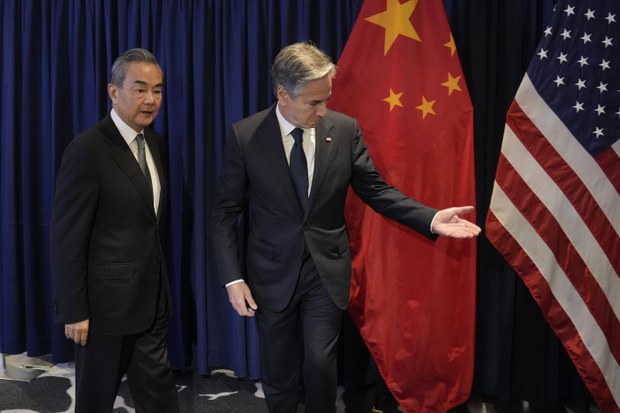Blinken, Wang Yi meet on ASEAN sidelines in Jakarta
Share

U.S. Secretary of State Antony Blinken (right), shows the way to Chinese Communist Party’s foreign policy chief Wang Yi during their bilateral meeting on the sidelines of the ASEAN Foreign Ministers’ Meeting in Jakarta, Indonesia, Thursday, July 13, 2023.
U.S. Secretary of State Antony Blinken arrived in Jakarta and met with Wang Yi, China’s leading diplomat, amid allegations of a Chinesecyberespionage attack targeting U.S. government emails.
The conversation between the two top diplomats on the margins of the Association of Southeast Asian Nations Foreign Ministers’ Meeting “was part of ongoing efforts to maintain open channels of communication to clarify U.S. interests across a wide range of issues and to responsibly manage competition by reducing the risk of misperception and miscalculation,” said State Department Spokesperson Matthew Miller.
Blinken made clear to Wang in Jakarta that any action that targets the U.S. government, U.S. companies or American citizens “is of deep concern to us, and that we will take appropriate action to hold those responsible accountable,” according to a senior State Department official.
The intrusion by Chinese hackers into email accounts at the State Department and other agencies – including that of Commerce Secretary Gina Raimondo – is believed to have begun in May and been discovered just before Blinken visited Beijing in June.
Diplomats who attended the closed-door 90-minute exchangedescribed the talks as more focused than the ones in Beijing, with both sides zeroing in on areas of interest.
On Blinken’s part, one key focus was fentanyl, a sometimes deadly painkiller behind what the U.S. Centers for Disease Control and Prevention calls an “opioid overdose epidemic.” In Beijing and again in Jakarta on Thursday Blinken pushed hard for China to crack down on the manufacture of “precursor chemicals” essential for making the drug.
According to China’s Ministry of Foreign Affairs, Wang reiterated China’s claims on Taiwan, called on Washington to cancel “unreasonable and illegal sanctions” against China and said the U.S. should “cease suppressing China’s economy and technology.”
Beijing suspended most formal lines of communication with the U.S. last August over a visit to Taiwan by then House speaker Nancy Pelosi. Further communications were cut off when the U.S. shot down a suspected spy balloon earlier this year.
The latest meeting came just hours after Xie Feng, China’s new ambassador to the U.S., held rare talks with a top U.S. defense official for Asia.
Ely Ratner, U.S. assistant secretary of defense for Indo-Pacific security affairs, stressed the importance of keeping lines of communication open with China.
Earlier in the month, U.S. Treasury Secretary Janet Yellen visited China, and climate envoy John F. Kerry is scheduled to visit from Sunday, with Beijing saying it is also open to a visit by U.S. Commerce Secretary Gina Raimondo.
Looming restrictions
U.S. diplomatic missions and reach-out to China may be undermined, however, as Washington pushes ahead with new restrictions on U.S. investments in Chinese companies involved in quantum computing, artificial intelligence and semiconductors, reported The New York Times.
The new restrictions were a key focus of discussion between Yellen and senior Chinese officials during her four days in Beijing, which concluded last Sunday.
During her visit to Beijing, Yellen repeatedly highlighted the fact that the restrictions were limited to several highly strategic sectors that affect U.S. state security and should not be interpreted as a blockade that sought to hold China’s development back.
It’s a line China is clearly not buying and the tensions between the two superpowers were further highlighted by China’s official responses to U.S. hacking allegations.
The Microsoft-hosted U.S. government email servers that were breached by a Chinese hacking group were detected and fixed “fairly rapidly,” National Security Adviser Jake Sullivan said Wednesday, despite Microsoft saying that the breach was only discovered a month after it happened.
When questioned on Thursday regarding the allegations of the hack, China’s Foreign Ministry urged the U.S. to “account for its cyberattacks as soon as possible rather than spread false information and divert attention.”
Chinese Foreign Ministry spokesman Wang Wenbin used his press briefing on Wednesday to accuse the U.S. government of overseeing “the world’s No. 1 hacking group” – the National Security Agency – but otherwise did not comment on the claims about the hack, known as Storm-0558.
Shaky ground
China is seeking to engage ASEAN’s 10 members, predominantly through trade, in a strategic push to undermine U.S. influence in the region and challenge the existing American-led world order.
However, China’s claim to almost all of the South China Sea limits its influence. Several ASEAN members, including Vietnam, Malaysia, Brunei, and the Philippines, have overlapping claims and have welcomed the U.S. military’s presence in the region. China regards U.S. involvement as foreign interference.
Blinken continued to engage with ASEAN nations in a series of meetings on Friday.
Washington aims to work with Southeast Asian nations to “push back” against an “upward trend” in Beijing’s “unhelpful, coercive and irresponsible” actions in the South China Sea, a senior U.S. State Department official said last week, ahead of Blinken’s visit.
“It’s not a matter of getting countries on board with the US view,” said Daniel Kritenbrink, the US assistant secretary for East Asian and Pacific affairs. “It’s a matter of working with our ASEAN partners to advance our shared view and vision for the region.”
This would require pushing “back on behavior that runs counter to that vision and to those principles, including the many irresponsible acts that we’ve seen carried out by China over the last several years and in the last several weeks,” he said.
Edited by Mike Firn.







